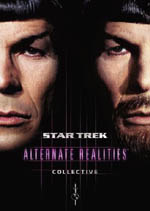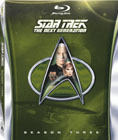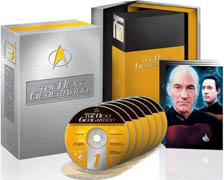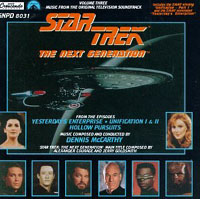
STAR TREK:
- The Original Series (TOS)
- The Animated Series
- The Movies
- The Next Generation (TNG)
- Deep Space Nine (DS9)
- Voyager
- Enterprise

THE NEXT GENERATION:
- TNG Season One
- TNG Season Two
- TNG Season Three
- TNG Season Four
- TNG Season Five
- TNG Season Six
- TNG Season Seven
Season Three:
-150: "Evolution"
-152: "Who Watches the Watchers"
-157: "The Vengeance Factor"
-159: "The Hunted"
-160: "The High Ground"
-163: "Yesterday's Enterprise"
-167: "Captain's Holiday"
-173: "Transfigurations"
-174-175: "The Best of Both Worlds"
-Season 3 Rankings

SCIENCE FICTION:
- Doctor Who
- Sliders
- The Matrix

- Main Index
- Site Map
|
Yesterday's Enterprise
(Star Trek - The Next Generation episode production code 163)
- story by Trent Christopher Ganino & Eric A. Stillwell
- teleplay by Ira Steven Behr, and
Richard Manning & Hans Beimler, and Ronald D. Moore
- directed by David Carson
- music by Dennis McCarthy
- 45 minutes
|
|
|

Yesterday's Enterprise
Star Trek The Next Generation has only dabbled idly with
time travel on a few occasions up until now, but this really
is the point where the new show put its feet in the cement
and defined how it, and subsequently the other
Star Trek spin-offs, would treat the subject.
And that treatment would continue very much in the same clueless
vein as in the original series episode
"The City on the Edge of Forever",
postulating the single re-writable line of time,
instead of the endless branching lines that
reflect reality so much more elegantly.
But does this show still stand up well in the light of more
elegant theories of time? It still remains a bit painful to
see the boneheaded view dominating the dialogue, but some
very good moments of voicing alternate viewpoints do come through
as well, and basic action remains strong. While this story
won't win any awards for time travel genius, it is considerably
better than the original series "City" episode.
Perhaps the biggest disappointment is in the imagery that most fans
will remember long afterwards, as
visual effects are brought in to support the writers' limited
view of time in this episode. Here, it looks as though Tinker Bell's
magic wand of time can change the whole universe magically in one fell swoop....
a very bad idea that many Trekkers now have a hard time shaking themselves free of.
|
|
 The "Alternate Realities" box set
The "Alternate Realities" box set
features Yesterday's Enterprise along with:
- Audio commentary by director David Carson.
- "Alternate Lives, Part 1" retrospective production featurette
More info & buying options
 The Blu-ray TNG Season 3 box set
The Blu-ray TNG Season 3 box set
features Yesterday's Enterprise along with:
- Audio commentary by director David Carson.
- Audio commentary by
co-writers Ronald D. Moore and Ira Steven Behr, and
scenic/graphic artists Mike and Denise Okuda.
|
Of course, since our expanded view of reality includes an infinite
number of parallel universes, each with equally valid timelines
branching out from each other, we have a slightly different view of
what is in play here. We don't believe we witness time change here.
We believe we slide to a parallel universe, one which is quite cool
and worth exploring. In terms of the characters, only Guinan slides
with us, or to be even more accurate, only a part of her consciousness
slides with us. Guinan is THE touchstone character for this episode,
and it is a bit of a pity that the story doesn't focus a little more
strongly on telling itself from her perspective. I'd find the
universe shifting effect at the beginning far more appropriate
if it had happened over Guinan's face instead of Picard's.
But of course, they want to emphasize the fact that Worf is
replaced by Ltn. Yar for this episode. Fair enough.
The effect works so well that it deeply impresses the fantasy
of magical changes happening through time travel as a Star Trek
staple, which has sadly dumbed-down a lot of the thought that
fans may have had on an interesting subject.
To be fair, better viewpoints are given significant voice in this story,
and Picard in particular has a lot of the best lines in this regard,
often in exchange with Guinan:
"Who is to say that this history is any less proper than the other?"
"I suppose I am."
"Not good enough, damn it, NOT good enough!"
Sweet. But still,
lines like these aren't particularly seen to win the argument
or decide the actions that will flow from the discussion, which is sad.
In actual fact, neither history is any more or less proper or wrong than
the other, although I'll give you that one is more preferable
than the other, and for sure, if you want to highlight your ability
to choose one or the other, go ahead by all means. But we need to
understand that the choice they discuss is accessed 22 years in the past.
Staying where they are while another ship comes in or out of that past
is not by itself enough to see history flip back and forth
between the two.
Thankfully, the temporal rift phenomenon is a bit of an unknown,
and if it has a side-effect on Guinan (and/or other members of her
species) to "slide" her back and forth between these two histories....
cool! I'm there.
"There's no logic in this at all!"
I think many of the characters end up arguing for and believing
something that isn't really true, however, and if the cameras had been
in all the right places at the right times, we would have seen many
of them bitterly disappointed, or worse.
I don't buy that the dark history came into being on Combat-Date 43625.2,
and then winked out of existence again at the end of the episode.
"This timeline must not be allowed to continue."
Sorry, but both timelines
branched off from each other 22 years prior to the episode's opening,
and both continue regardless of what happens here.
The characters we spend most of our time watching in this episode
are most akin to the characters in the "Mirror, Mirror" universe
in the "Enterprise" two-part story
"In a Mirror Darkly", who don't
really get to interact with or become aware of their counterparts
in the regular Star Trek universe, leading separate lives both
before and after the episode in question.
Guinan's counterpart is perhaps the most unusual, because her everyday
consciousness must have been either displaced by or merged with
the consciousness that slid from our familiar Star Trek universe,
a temporary condition that we trust is reversed at the end of the
episode. Her part in this tale is easily the one that raises the
most questions and red flags. It is the merged or foreign part of her
consciousness that feels that everything is wrong, struggling to find
a way to slide back to where it came from. Guinan seems somewhat
unsophisticated and unspiritual to constantly lay so much
negative judgement on this equally valid line of history,
demonstrating that she is as clumsy with understanding temporal dynamics
as most other Star Trek characters, and I tend to not want to root
for her these days as much as the writers had probably intended.
Perhaps it truly is best that they didn't focus the story more on her,
at least not before they come to better understand time and choice.
Refreshingly,
director David Carson speaks far more about parallel universes
than time travel in his interviews and commentaries, so perhaps
the trend in perception is shifting back onto healthy lines....
"...We'd better get used to being in the here and now."
A great balancing line from Captain Garrett.
The "here and now" are where any person's true choices lie,
no matter when they find themselves. And the great thing about this
story is that, even though "here and now" motivations don't quite
get as much air-time as Guinan's ideas, they are still present and very
well fleshed-out and articulated throughout the story.
Firstly, unlike in "The City on the Edge of Forever", the repercussions
from the actions of 22 years ago that led to the differences in the two
timelines are credible and logical, based on the values of the
Klingon race and nicely pointed out by Commander Data. Good.
Also, Tasha Yar and others have clearer, more solid choices and
motivations as well. The crew of Enterprise C has the option
of making a small difference in Combat-Date 43625 in a fight
that isn't really theirs, or a bigger one 22 years ago by defending
an outpost that called for their help. They make a fair choice,
with Captain Garrett voicing many good non-time-travel reasons
that the rest of her crew have. The mission they choose remains noble
and heroic without any time travel aspect. Enterprise C gets my
blessing.
Yar herself makes a fair choice. I don't believe there was any danger
of her winking out of existence should she stay on Enterprise D
while Enterprise C succeeded, but enough
time is spent examining her character and motivations to make anyone
believe that she is on-purpose, following her heart, and let's face it,
being quite noble and heroic. Right on. Plus, she may also be surviving
longer by getting off Enterprise D before it has a warp core breach.
Yar gets my blessing.
Picard and the Enterprise D characters busy themselves with supporting
Yar and Enterprise C, a move that seems to be heading towards costing
them their lives and their ship. It's also very noble and heroic,
and gets my blessing. The cameras simply don't stick around in that
dark timeline long enough to give you the final word on their fate,
which is fair, but I'll bet most of the people making this episode
and watching it think the timeline ended there. I say it continues.
We know at minimum that Riker bought it. Should Picard and others
survive, possibly without their ship, they may well doubt that they
achieved anything. But they did, and I find their situation quite
reminiscent of the one I imagine for the 22nd century rebels in
"Day of the Daleks" (Doctor Who story no. 60).
They assisted their doubles in
a parallel (or branching) universe, helping make that place more noble,
more harmonious, and more interesting. They helped the versions
of themselves that we follow week after week on the regular series.
It's good. However, they will still have their own war with the
Klingons to deal with, one that doesn't disappear in a wave of temporal
magic, and their choices in dealing with that remain in their present.
Good luck to them.
For the regular "home universe" crew of Enterprise D that we see each
week, this is pretty much "The Adventure That Never Happened", and it's
always a disappointment whenever a time travel story boils down to that.
Except that we can still say that part of our Guinan's consciousness
had an outing, spending a couple days in an alternate universe, and
coming back without missing a second in this one.
Even if she never expressed herself as elegantly as we would have liked
while in that dark universe, she did help inspire others to greatness,
and it's hard to be too disappointed with that. And her last line
clearly indicates that she remembers everything. Excellent.
She probably won't feel able to REALLY discuss all the details with
everyone.... but then again, why not? She doesn't seem to be afraid
to bring up some of the subjects. All good.
The episode seems to introduce a number of firsts for the show,
including what seems to be the first use in all of Star Trek of the word
"gravimetric", which will go on to become one of the most
overused staples of nonsensical technobabble in the franchise.
I've been guilty of throwing it into my own Star Trek screenplays
as well, and wondering exactly what I was talking about afterwards.
My encyclopedia actually mentions "gravimetric analysis" as a
destructive chemical
process performed on a substance so that you can weigh it to find
out what it is. Somehow, I don't think starship sensors are doing
this at long range to outer space phenomena, as Mr. Data's dialogue
would indicate in this episode, or most other characters' dialogue
would indicate through the rest of Star Trek. Oh well.
The phrase still sounded fascinating at the time.
|
We also get what is probably television Star Trek's most ambitious
and lengthy space battle yet, particularly in the number of new
optical shots required, and the number of ships in each shot.
Far fewer stock shots of the Enterprise
are used in this story than normal; instead we always seem to get
something new and unique that highlights the situation's tactics.
Impressive stuff, even outdoing some of the original feature films.
This will become staple fare in the TV shows going forward,
but "Yesterday's Enterprise" is definitely pioneering it and taking
it to a new level here. Excellent.
We also see Wesley Crusher in a proper red Starfleet uniform for the
first time.... or at least a parallel Wesley in a parallel proper
red Starfleet uniform. It sure beats the grey thing with the pants
always retardedly coming undone in the back, which we will still
have to put up with until "Ménage à Troi" near the
end of this season.
Although the story is keen to ensure that Worf gets his due given the
fact that we won't see him in the dark timeline, Troi is not seen
in the dark timeline either, and unlike Worf, she doesn't even get
any lines this episode either. We just see her in her bright blue
dress sitting on the bridge during the opening and closing of the show.
A pity, as her perspectives might have been interesting. Then again,
we doubt that these writers could have given her much to improve on
their take of the temporal situation.
|
|
Dennis McCarthy's score for "Yesterday's Enterprise" is available here:
|
|
Star Trek often seems to thrive best when doing soul-searching just
before an impending great battle, a pattern common to both this
fan-favourite episode and the upcoming season three cliffhanger.
Perhaps it's just an excellent way of triggering a deeper examination
of the human condition than usual for large ensembles of
characters all at the same time, followed of course by some exciting
action. Nice formula. This episode also adds darker, moodier lighting
for most scenes, which is good, although Ten Forward is a good contrast
by having much brighter lighting than usual. It's a very successful
mix this time around.
Director David Carson does an excellent job here in his second
Next Generation episode (the first being "The Enemy" earlier in the
year). In fact, I think he does much better with this television gem
than he would later do in the seventh Star Trek feature film
"Generations". Shot compositions are more thoughtfully and
artistically constructed, showcasing clarity and story-telling
economy. Also, notice we only get brief camera shakes when it will
have emotional impact, unlike the constant overuse featured in
"Generations". "Yesterday's Enterprise" is a tour-de-force for
Carson.
In the end, even if this Star Trek episode can't get full marks for
its handling of time travel (surprise, surprise), a little creative
thinking, free from any need for the characters to have expressed
accurate time theory during the story, can easily have you thoroughly
enjoying the story and continuing to root for the characters
most of the time, including when it counts the most. And so,
I'm pleased to announce that "Yesterday's Enterprise" is an
enjoyable, imperfect, thought-provoking big winner.
This Next Generation Season Three time travel story
is available on DVD and Blu-ray:

|
Star Trek: The Next Generation - Season Three (1989-1990):
Captain Jean-Luc Picard and crew hit their stride
in this third season of Star Trek: The Next Generation,
and truly began to shine as only they could.
Watch all 26 ground-breaking episodes, culminating
in the season cliffhanger that many regard as the
first half of the best Next Generation story of all time.
Includes 26 episodes @ 45 minutes each.
Click on the Amazon symbol for the desired disc format
and location nearest you for more information:
|
|
DVD U.S.


|
DVD Canada


|
DVD U.K.
 (regular) (regular)

|
|
7-disc DVD set
|
DVD U.S.


|
DVD Canada


|
DVD U.K.
 slimline
slimline

|
DVD Extras include 4 featurettes:
- Season 3 "Mission Overview" (17 min.)
- Crew Changes (14 min.)
- Dept. Briefings: Production (20 min.)
- Dept. Briefings: Memorable Missions (13 min.)
These extras feature interviews by cast and crew discussing
favourite memories, cast input and response to character
development, and new writer Michael Piller's insights into
episodes' story mechanics.
|
Blu-ray U.S.


NEW for
April 30, 2013.
| Blu-ray Canada


NEW for
April 30, 2013.
| Blu-ray U.K.


NEW for
April 29, 2013.
|

| 6-disc Blu-ray box set |
Additional Blu-ray Bonus Features include:
- 5 Audio commentaries including:
- "The Bonding" with writer Ronald D. Moore and
scenic/graphic artists Mike and Denise Okuda.
- "Yesterday's Enterprise" with Moore, the Okudas, and
co-writer Ira Steven Behr.
- "Yesterday's Enterprise" with director David Carson.
- "The Offspring" with writer René Echevarria and the Okudas.
- "Sins of the Father" with Moore, the Okudas, and
visual effects technician Dan Curry.
- "Assimilating the Next Gen." (HD) 3-part season three making-of documentary (90 min. total),
with Moore, Behr, Echevarria,
Patrick Stewart (Captain Picard),
Jonathan Frakes (Riker),
Brent Spiner (Data),
Gates McFadden (Dr. Crusher),
Michael Dorn (Worf).
- "Inside the Writers' Room" (HD) roundtable interview (71 min.) with
Moore, Echevarria, Brannon Braga,
and Naren Shankar.
- A Tribute to head writer Michael Piller (HD, 14 min.)
- Gag Reel (HD, 9 min.)
- In Memoriam: David Rappaport (5 min.)
- Promos for each individual episode
- plus, all featurettes from the DVD version.
|
Article & reviews written by Martin Izsak.
Comments are welcome. You may contact
the author from this page:
Contact page
|










 (regular)
(regular)



